高考英语 考前冲刺专题强化情态动词和虚拟语气
高考英语复习知识点:情态动词和虚拟语气及英语作文结尾万能公式

高考英语复习知识点:情态动词和虚拟语气及英语作文结尾万能公式高考英语复习知识点:情态动词和虚拟语气虚拟语气在高考命题中不是重点,但是难点。
考点常集中在含蓄条件句以及主语、宾语从句等特定句型中虚拟语气的使用上,因此考生应熟练掌握含蓄条件句中主从句的时态要求以及一些典型句型中虚拟语气的具体形式。
虚拟语气考点透析考点一、虚拟语气的基本用法1.与现在事实相反的虚拟语气,基本结构为:主语+动词的一般过去时(be动词用were)+其他成分+if+should/would/could...+动词原形+其他成分。
例如:①If it were not for the fact that she ______ sing,I would invite her to the party.A.couldntB.shouldntC.cantD.might not解析句意为:如果不是因为她不会唱歌的事实,我会邀请她来参加那次聚会的。
that从句为同位语从句,描述的是事实,用陈述语气。
正确答案为C。
2.与过去事实相反的虚拟语气,基本结构为:主语+动词的过去完成时+其他成分+if+should/would/could...+have done+其他成分。
例如:If the weather had been better,we could have had a picnic.But it ______ all day.A.rainedB.rainsC.has rainedD.is raining解析句意为:如果天气好的话,我们是能够去野餐的,但是下了一天的雨。
句子前半部分陈述的是与过去事实相反的事情,所以用了虚拟语气。
下了一天的雨是事实,所以用陈述语气。
因为是发生在过去的事实,所以正确答案为A。
3.与将来事实相反的虚拟语气,基本结构为:主语+动词的一般过去时/should do/were to do+其他成分+if+should/would/could...+动词原形+其他成分。
高考英语复习 语法专题精讲精练 情态动词和虚拟语气
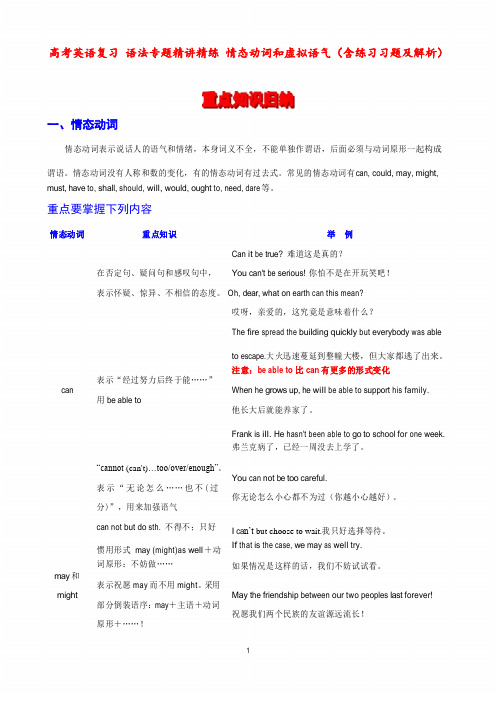
高考英语复习语法专题精讲精练情态动词和虚拟语气(含练习习题及解析)一、情态动词情态动词表示说话人的语气和情绪,本身词义不全,不能单独作谓语,后面必须与动词原形一起构成谓语。
情态动词没有人称和数的变化,有的情态动词有过去式。
常见的情态动词有c an,could,may,might, must,have to,shall,should,will,would,ought to,need,dare等。
重点要掌握下列内容情态动词重点知识举例在否定句、疑问句和感叹句中,Can it be true?难道这是真的?You can't be serious!你怕不是在开玩笑吧!can 表示怀疑、惊异、不相信的态度。
Oh,dear,what on earth can this mean?哎呀,亲爱的,这究竟是意味着什么?The fire spread the building quickly but everybody was ableto escape.大火迅速蔓延到整幢大楼,但大家都逃了出来。
注意:be able to比can有更多的形式变化表示“经过努力后终于能……”When he grows up,he will be able to support his family.用be able to他长大后就能养家了。
Frank is ill.He hasn't been able to go to school for one week.弗兰克病了,已经一周没去上学了。
“cannot(can't)…too/over/enough”。
You can not be too careful.表示“无论怎么……也不(过你无论怎么小心都不为过(你越小心越好)。
分)”,用来加强语气can not but do sth.不得不;只好惯用形式may (might)as well+动词原形:不妨做……I ca n’t but choose to wait.我只好选择等待。
2024届高考英语一轮复习语法专题:情态动词和虚拟语气+课件

我多希望有辆自己的车啊!
用于wish 后的宾语
从句
表示与过去事实相反,从句 谓语用had done
Sophia wished she hadn't done it.索菲娅希望她没做那件事。 I wish she had taken my advice. 那时她要是听我的建议就好了。
她本该把真相告诉他的。
should/ought to have done
He should have passed the driving test easily. 本该做而实际上未做
他本应该轻而易举地通过驾照考试的。
should not/ought not to have done
本不该做而做了
She shouldn't have left the hospital so soon, for she had not yet recovered.她本不该那么早就离开医院的,因为 她还没有康复。
can/could have done
①本来能够做 ②(过去)可能做
If you had been more carefully, you could have done better.如果再细心一点,你本可以做得更好。 John can/could have been seriously hurt in the accident. 约翰可能在那次事故中受了重伤。
如果你考试考得好,你将得到一台新电脑。(允诺)
1. 常见情态动词的基本用法
情态动词
用法
示例Biblioteka You should do it because you have promised to. 表示劝告、建议或义务、责任
《高考英语二轮复习资料》情态动词和虚拟语气---原创版.docx
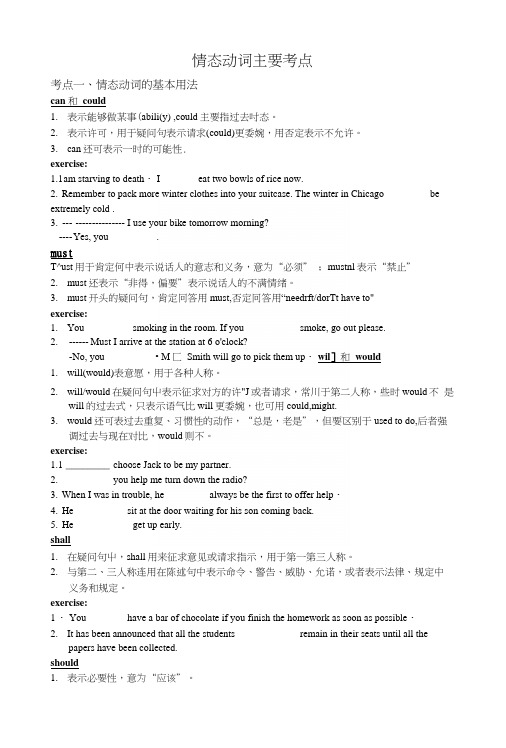
情态动词主要考点考点一、情态动词的基本用法can 和could1.表示能够做某事(abili(y) ,could主要指过去吋态。
2.表示许可,用于疑问句表示请求(could)更委婉,用否定表示不允许。
3.can还可表示一时的可能性.exercise:1.1a m starving to death・ I ______ eat two bowls of rice now.2.Remember to pack more winter clothes into your suitcase. The winter in Chicago ________ be extremely cold .3.--- --------------- I use your bike tomorrow morning?---- Y es, you _________ .mustT^ust用于肯定何中表示说话人的意志和义务,意为“必须” ;mustnl表示“禁止”2.must还表示“非得,偏要”表示说话人的不满情绪。
3.must开头的疑问句,肯定冋答用must,否定冋答用“needrft/dorTt have to"exercise:1.You _________ smoking in the room. If you ___________ s moke, go out please.2. ------ Must I arrive at the station at 6 o'clock?-N o, you __________ • M匚Smith will go to pick them up・wil]和would1.will(would)表意愿,用于各种人称。
2.will/would在疑问句屮表示征求对方的许"J或者请求,常川于第二人称,些时would不是will的过去式,只表示语气比will更委婉,也可用could,might.3.would还可表过去重复、习惯性的动作,“总是,老是”,但要区别于used to do,后者强调过去与现在对比,would则不。
高考英语专题五 情态动词 和 虚拟语气

专题五情态动词和虚拟语气情态动词:一,必要性:must needn’t don’t have to should1, must 表现在,将来必须2, don’t have to don’t need to do needn’t do 表现在将来不必3,needn’t have done 本来不必做而做了。
didn’t have to do= it was not necessary to do 过去不必做。
(不强调是否做了)Should do (现在,将来)4,should 义务上应该做Should have done (过去)二,表推测,可能性:1, 客观不可改变的可能性:常表示说明人或事物的特征。
---canE.g: Accidents can happen on such rainy days.2, 具体事情实际发生的可能性:1) must: 必然,必定(不用于否定和疑问)2)should, ought to: 按说应该;应该不会(一般不用于疑问)3)can 不可能;有可能。
吗?(不用于肯定)4)could 表微弱可能;不可能;不可能。
吗?5)may 或许,也许;可能不;(不用于疑问)6)might 或许,也许;可能不;(不用于疑问)Can 表推测时,用于否定,疑问,表示一种疑惑,惊讶或不相信语气。
This can’t / couldn’t be done by him. (不相信)This may not be done by him. (不确定)Could,might 并不与过去时间有关,表示语气比can, may 语气弱。
Should 表推测时,表示合乎理想的情况或结果。
We should arrive before dark.三,表能力:Can / am, is, are, able to do 表现在的能力Will be able to do 表将来能力Could/ was, were able to do 表过去能够Could have done 表过去有能力但未做四,表请求,允许:1,当询问,请求的对象为决策者时:Shall i/we ...?May i /we ...?Will /Would you ...?2, could/ might/would/should...? 表委婉气3,shall 与第二,第三人称连用用于陈述句,表示说话者的命令,威胁,警告。
高考英语情态动词和虚拟语气讲解
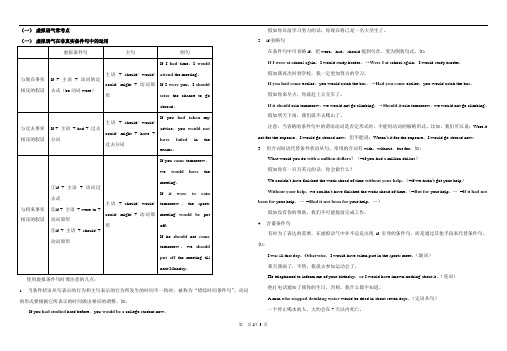
(一)虚拟语气常考点(一)虚拟语气在非真实条件句中的运用使用虚拟条件句时要注意的几点:1.当条件状语从句表示的行为和主句表示的行为所发生的时间不一致时,被称为“错综时间条件句”,动词的形式要根据它所表示的时间做出相应的调整。
如:If you had studied hard before,you would be a college student now。
假如你以前学习努力的话,你现在将已是一名大学生了。
2.if省略句在条件句中可省略if,把were,had,should提到句首,变为倒装句式。
如:If I were at school again,I would study harder。
→Were I at school again,I would study harder。
假如我再次回到学校,我一定更加努力的学习。
If you had come earlier,you would catch the bus。
→Had you come earlier,you would catch the bus。
假如你来早点,你就赶上公交车了。
If it should rain tomorrow,we would not go climbing。
→Should it rain tomorrow,we would not go climbing。
假如明天下雨,我们就不去爬山了。
注意:当省略的条件句中的谓语动词是否定形式时,不能用动词的缩略形式。
比如,我们可以说:Were it not for the expense,I would go abroad now。
但不能说:Weren’t it for the expense,I would go abroad now。
3.用介词短语代替条件状语从句。
常用的介词有with,without,but for。
如:What would you do with a million dollars?(=if you had a million dollars)假如你有一百万美元的话,你会做什么?We couldn’t have finished the work ahead of time without your help。
专题03 情态动词和虚拟语气(解析版)(全国通用版)-高考英语复习

专题03 情态动词和虚拟语态情态动词★ 情态动词:can, could, may, might, must, ought to, shall, will, would, need ,dare1. 表示推测的情态动词1.1基本原则:1.1.2 对现在或将来情况推测,用情态动词+do / be / be doing…对过去的推测,用情态动词+have done / been…1.1.3表示肯定推测的情态动词,按可能性由大到小依次为:must> should / oughtto>may>might>could1.1.4否定推测,按语气由强到弱依次为:can’t / couldn’t(根本不可能)>may not> mightnot/could not(可能不)。
1.2 具体用法:1.2.1 must be表示推测,意为“一定是……” 只用于肯定句中must have done意为“一定做过某事或某事肯定发生了” 并且有前文铺垫e.g. Listen! There must be some children in the room.The road is wet. It must have rained last night.1.2.2 should (not) / ought (not) to在中表示根据常规或常识推测,表示“某事应该或不应该发生”e.g. It is nearly 7 o’clock. Jack should be here at any moment.You shouldn’t be texting in the class now. We are having a lesson.(should not 含有责备之意)1.2.3 can, could表达推测时,一般用于疑问句和否定句中;can用于肯定句中表示一种理论上的可能性,意为“有时候会…”,并不牵涉是否真的会发生;could用于肯定句中,语气比may/ might更弱。
高考英语 冲刺讲义七 情态动词和虚拟语气

落堕市安心阳光实验学校七、情态动词和虚拟语气情态动词I.情态动词基本用法情态动词用法否定式疑问式简答式can 能力(体力,智力,技能)允许或许可(口语中常用)可能性(表猜测,用于否定句或疑问句中)can not / cannot/can’t doCan…do…?Yes,…can.No,…can’tcould couldn’t domay 可以(问句中表示请求)可能,或许(表推测)祝愿(用于倒装句中)may not doMay…do…?Yes,…may.No,…mustn’t/can’t.might might not do Might…do…?Yes,…might No,…might not.must 必须,应该(表主观要求)肯定,想必(肯定句中表推测)must not/mustn’t doMust…do…?to.Yes,…must.No,…needn’t/don’t havehave to 只好,不得不(客观的必须,有时态和人称的变化)don’t have to do Do…ha ve to do…?Yes,…do.No,…don’t.ought to 应当(表示义务责任,口语中多用ought notto/oughtn’t to doOught…to do…?Yes,…ought.No,…oughtn’t.should)shall用于一三人称征求对方意见用于二三人称表示许诺、命令、警告、威胁等shall not/shan’t do Shall…do…?Yes,…shall.No,…shan’t.should应当,应该(表义务责任)本该(含有责备意味)shouldnot/shouldn’t doShould…do…?will 意愿,决心请求,建议,用在问句中would比较委婉will not/won’t doWill/Would…do…?Yes,…will.No,…won’t.wouldwould not/wouldn’tdodare敢(常用于否定句和疑问句中)dare not/daren’t do Dare…do…?Yes,…dare.No,…daren’t.need需要,必须(常用于否定句和疑问句中)need not/needn’t do Need…do…?Yes,…must. No,…needn’t.usedto过去常常(现在已不再)usednot/usedn’t/usen’tto dodidn’t use to doUsed…to do…?Did…use to do…?Yes,…used.No,…use(d)n’t.Yes,…did.No,…didn’t.II.情态动词的重点知识表示“能力、许可”的can和may表示能力的情态动词用can/couldA computer_____think for itself; it must be toldwhat to do.A.can’tB.m ust n’tC.may notD.might not表示许可时用may/might ,can/could 都可以,但在问句中用could…?或might…?以使口气委婉客气,其回答一定要用can或may,以使回答口气明确(must表示一定,必须,mustn’t表示禁止,不许可)。
第03讲情态动词和虚拟语气(精讲)2024年高考英语高频考点题型归纳与方法总结(新高考通用)

【一轮复习讲义】2024年高考英语高频考点题型归纳与方法总结(新高考通用)第03讲情态动词和虚拟语气(精讲)题型目录一览考点1、情态动词的用法分考点1. 情态动词的基本用法(1)、can, could①、表示能力,意为“能,会”;could表示过去的能力,不表示是否做。
·●She can speak French fluently. 她能讲一口流利的法语。
●Our daughter could walk when she was nine old. 我们的女儿九个月大时就会走路了。
②、can可用于肯定句中,表示客观或理论上的可能性。
● He is confident a solution can be found. 他确信会找到解决办法。
●An experienced teacher can make mistakes. 一位有经验的老师也会犯错。
③、表示请求或允许。
在疑问句中, could可以代替can,语气更委婉,但回答时要用can。
●---Can/ Could I use your bike tomorrow morning?----Yes, you can.---明天上午我可以用你的自行车吗?----是的,可以。
①、表示可能性,意为“可能”,can多用于否定句和疑问句中,could不受限。
can比could语气强。
●He can't be our manager. Our manager has gone to Beijing..他不可能是我们经理。
我们经理已经去北京了。
⑤、表示惊异、怀疑、迷惑等态度,常用于否定句和疑问句中。
● How can you treat me like that? 你怎么能那样对我?⑥、用于固定习语中:can't....too/ enough(无论…也不过分;越…越好);can' but do sth..(不得不做某事,只好做某事);can' t help doing sth...(禁不住做某事)。
高考英语 冲刺专题化情态动词和虚拟语气
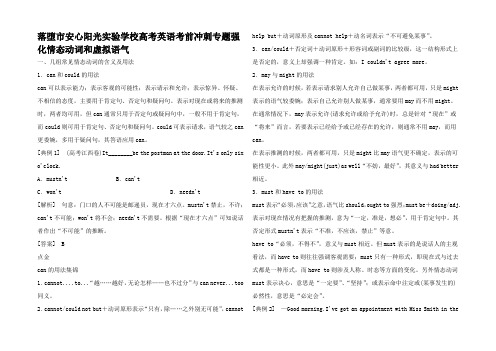
落堕市安心阳光实验学校高考英语考前冲刺专题强化情态动词和虚拟语气一、几组常见情态动词的含义及用法1.can和could的用法can可以表示能力;表示客观的可能性;表示请示和允许;表示惊异、怀疑、不相信的态度,主要用于肯定句、否定句和疑问句。
表示对现在或将来的推测时,两者均可用,但can通常只用于否定句或疑问句中,一般不用于肯定句,而could则可用于肯定句、否定句和疑问句。
could可表示请求,语气较之can 更委婉,多用于疑问句,其答语应用can。
[典例1] (高考江西卷)It________be the postman at the door.It's only six o'clock.A.mustn't B.can'tC.won't D.needn't[解析] 句意:门口的人不可能是邮递员,现在才六点。
mustn't禁止,不许;can't不可能;won't将不会;needn't不需要。
根据“现在才六点”可知说话者作出“不可能”的推断。
[答案] B点金can的用法集锦1.cannot....to...“越……越好,无论怎样……也不过分”与can never...too 同义。
2.cannot/could not but+动词原形表示“只有,除……之外别无可能”,cannot help but+动词原形及cannot help+动名词表示“不可避免某事”。
3.can/could+否定词+动词原形+形容词或副词的比较级,这一结构形式上是否定的,意义上却强调一种肯定。
如:I couldn't agree more。
2.may与might的用法在表示允许的时候,若表示请求别人允许自己做某事,两者都可用,只是might 表示的语气较委婉;表示自己允许别人做某事,通常要用may而不用might。
在通常情况下,may表示允许(请求允许或给予允许)时,总是针对“现在”或“将来”而言,若要表示已经给予或已经存在的允许,则通常不用may,而用can。
2023年高三英语复习核心知识点情态动词和虚拟语气

情态动词和虚拟语气一、问:本考点旳命题思绪是什么?答:情态动词要注意如下3个方面:1、重视在语言环境中根听说话人旳语气来使用情态动词。
2、情态动词表达推测或判断旳使用方法考察。
3、设置场景考察学生纯熟使用表达责怪等旳情态动词加完毕时旳使用方法等。
虚拟语气是历年高考旳选考考点。
考点常集中在含蓄条件句以及宾语从句中旳虚拟语气上。
所设选项常通过谓语动词旳特殊形式来表达,并且都是结合详细语境来考察对考点旳运用能力。
此后高考对虚拟语气旳命题重点仍会是在特定语境中考察虚拟语气中旳含蓄虚拟条件句、宾语从句中旳谓语动词等。
例1:(08上海卷). According to the air traffic rules, you ___ switch off your mobile phone before boarding.A. mayB. canC. wouldD. should【答案】D。
【题源探究】考察should旳基本使用方法。
【广角思维】句意为“根据航空交通法,有在登机前应当把手机关掉。
”should“应当”符合该句语境因此答案为D。
【易误警示】不能精确地把握该提旳语境是考生在做该题时出现旳重要错误。
做此类试题时一定要通过语境把握准语境体现出来旳说话人旳语气和态度。
【悟彻高考】should旳其中一种重要使用方法是:should 作为情态动词,一般用来表达目前或未来旳责任或义务,译作“应当”、“应当”,这时它可以和ought to,be supposed to 互换使用。
例如:You should (= are supposed to )complete your test in time.你们应当准时做完你们旳试验。
You should (= ought to )tell your mother about it at once.【同类预测】对should旳这种使用方法旳考察会比较灵活,也比较常见,有时会运用ought to 来考察该使用方法。
高中英语2025届高考语法复习情态动词与虚拟语气知识讲解
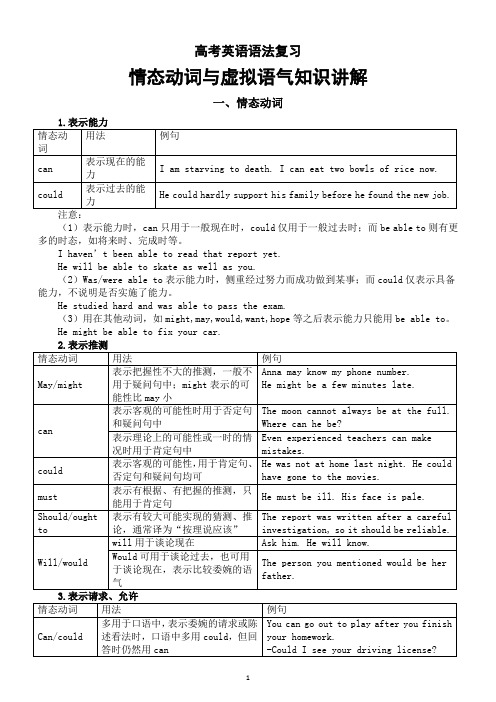
高考英语语法复习情态动词与虚拟语气知识讲解一、情态动词(1)表示能力时,can只用于一般现在时,could仅用于一般过去时;而be able to则有更多的时态,如将来时、完成时等。
I haven’t been able to read that report yet.He will be able to skate as well as you.(2)Was/were able to表示能力时,侧重经过努力而成功做到某事;而could仅表示具备能力,不说明是否实施了能力。
He studied hard and was able to pass the exam.(3)用在其他动词,如might,may,would,want,hope等之后表示能力只能用be able to。
He might be able to fix your car.(1)must还可以表示质问或感情色彩,意为“偏要,偏偏”。
Why must it snow on Saturday?(2)should还可以表示惊奇、愤怒、失望等特殊情感,尤其用在以why,who,how等开头的疑问句中或某些感叹句中。
why should you be so late today?(1)must作“必须”讲的一般疑问句,其肯定回答用must,否定回答用needn’t或don’t have to。
-Must I pay now?-Yes, you must./No, you needn’t.(2)need还可以作实义动词,有人称和数的变化,后跟带to的不定式作宾语。
She needed to go out for a walk.(1)两者在表示过去的习惯动作或行为时常可通用。
When we were children, we would/used to go skating every winter.(2)Used to与would都不能与表示具体频率、次数的词及特定的时间状语或具体的一段时间连用。
高考语法必考点专题复习10--情态动词和虚拟语气

语法考点专题复习(10)---情态动词和虚拟语气【知识框架】[注意]虚拟条件句与主句的谓语动词——与现在事实或将来可能的事实相反,从句用一般过去时(be用were);与将来可能事实相反时还可用were to/should+动词原形,主句用would/should/could/might +动词原形;与过去事实相反,从句用过去完成时,主句用would/should/could/might have+过去分词。
1.熟记虚拟语气的三种句型公式(1)表示与现在事实相反的情况(2)表示与过去事实相反的情况(3)表示对将来情况的主观推测2.表示能力,can与be able to一般可互换,但be able to可用于将来时和完成时等更多时态;在表示过去具体某次能够成功做成某事时,只能用was/were able to。
3.表示请求许可,可说May/Might/Can/Could I...?但表示给予许可时,不能用might/could,即不说you might/could。
4.must强调主观认为“必须”做某事,只有一般现在时态;而have to强调客观上要求“不得不”做某事,有更多的时态变化;mustn't“不准”,而don't have to=needn't“不必”。
5.表示“应该,应当”,should和ought to可互换,只是ought to的语气稍重;should强调主观看法,而ought to强调客观要求。
6.表示推测的情态动词,若按语气强弱排列,依次有must,can,could,may,might等。
其中,could,might不一定是can,may的过去式,只是语气分别比can,may更弱。
使用时注意以下几点:(1)must只用于肯定句,表示有把握的推测,可译作“一定会,准会”。
(2)can一般不用于肯定句,可译作“可能”;但语气稍弱的could可用于肯定句;can表示“有时也会”时也可用于肯定句。
高考情态动词与虚拟语气考点

⾼考情态动词与虚拟语⽓考点情态动词与虚拟语⽓常考考点⼀情态动词+have done情态动词+have done 表⽰对过去的虚拟1.I have watched that movie it’ll give me horrible dreams.A.Shouldn’tB.needn’tC.couldn’tD.mustn’t2.Mark have hurried. After driving at top speed, he arrived half an hour early.A.needn’tB.wouldn’tC.mustn’tD.couldn’tC.shouldD.shouldn’t4.It have been Tom that parked the car here, as he is the only one with a car.A.mayB.canC.mustD.should5. He didn’t regret saying what he did but felt that he it differently.A.could expressB. would expressC.could have expressedD.must have expressed6. -----I’m sorry. I at you the other day.------Forget it, I was a bit out of control myself.C.mustn’t shoutD.mustn’t have shouted7.-----Where is my dictionary? I remember I put it here yesterday.-------You it in the wrong place.A.must putB. should have putC.might putD.might have put8. The weather turned out to be fine yesterday, I the trouble to carry my umbrella with me.A.should have takenB.could have takenC.needn’t have takenD. mustn’t have taken9. As you worked late yesterday, you have come this morning.A.mayn’tB.can’tC.mustn’tD.needn’tB.could have doneC.mustn’t have doneD. should do11.you have broken your promise; You painting the house long ago.A. could have finishedB. had better finishC. must have finishedD.should have finished12.------ I didn’t go fishing last Sunday because my car broke down.---------- you mine. I wasn’t using it.A.should borrowB. could have borrowedC.could borrowD.must have borrowed13. My newly-purchased magazine is nowhere to be found. I have left it on the train?A.CouldB. ShouldC.MustD.Would14. You the meeting to tell me that .you could have come up to me afterwards.A.should have come toB.needn’t have interruptedC.ought to attendD.mustn’t go to15. -----What are you doing, dear?-------I’m watching the football game.-------What? You your homework first.A.would have doneB.must have doneC.should have doneD. may have done⼆.情态动词常考情况Driving on the highway can be dangerous2.shall 可以表⽰命令,警告,威胁,许诺,宣布法律规定时也要⽤shall.You shall leave the room at once.It has been announced that candidates shall remain in their seats until all the papers have been collected. He asked me for this book many times. Please tell him he shall have it tomorrow.My father told me, “You shall have a computer on your 18th birthday.”3.May well 与may as wellmay well + 动词原形,表⽰很可能He may well be proud of his son.Her appearance has changed so much that you may well not recognize her.may as well+动词原形,表⽰“最好,满可以,倒不如”You may as well do it at once.We may as well stay where we are.4.must 表⽰偏要,硬要Must you make so much noise?If you must smoke, please go out.情态动词基本⽤法练习1.It is usually warm in my hometown in march, but it be ratherD.would2.Peter be really difficult at times even though he’s a nice person in general.A. shallB.shouldC.canD.must3.Don’t let your head out of a moving bus, which lead to a terrible disaster.A.canB.shouldC.mustD.will4. -----Can I pay the bill by check?--------Sorry,sir. But it is the management rules of our hotel that payment be made in cash.cation5.----- What does the sign over there read?-------- “No person smoke or carry a cigarette, cigar or pipe in this area.”A.WillB. mayC. shallD. must6.------I haven’t got the reference book yet, but I’ll have a test on the subject next month.-------Don’t worry, you have it by Friday.A.CouldB.shallC.mustD.may7. Being examed twice a year, whether it is a car or a bus or a truck, is the rule that every driver obey in this city.A.shallB.canC.ought toD.needC.would D . shall9. It is a set rule that all payment be made by the end of the month.A.willB. shallC. canD. may10.Lisa well not want to go on the trip. She hates travelling.A.willB. canC.mustD.may11. ------The work will take me another week. I’m really tired.-------I think you as well consult an experienced worker.A.mayB.canC.needD.must12. If you talk about it with me, please wait till I finish mywork at hand.A. canB. mayC. mustD. should13. Nick, stop screaming like crasy! Why you watch thatstupid football match at one in the morning?A. shallB. wouldC. shouldD. must14. If you go, at least wait until the storm is over.A. can15.-----May I smoke here?-------If you , choose a seat in the smoking section.A.ShouldB. couldC.mayD.must16. -------Why didn’t you come to Simon’s party last night?-------I wanted to, but my mum simply not let me out so late at night.A.couldB.mightC. wouldD. should17. ------Are you going to the lecture tomorrow afternoon?-------I’m not sure now. I go to Professor Black’s class instead.A.mightB. wouldC. shouldD. must18. ----- I book a table for dinner a few dsays ahead of time?------- Yes, you . The restaurant is always full, especially during the holidays.A.Must; willB. Must; canC. shall; shallD. shall; must19. You can’t imagine that a well-behaved gentleman be sorude to a lady.A. mightB.needC. shouldD. would20. My MP4 isn’t in my bag. Where I have put it?A. can三. 虚拟语⽓主从句时态练习1------John went to the hospital alone.-------If he me about it, I would have gone with him.A.should tell2.------The weather has been very hot and dry.-------Yes. If it had rained even a drop, things would be much better now! And my vegetables .A.wouldn’t dieB. didn’t dieC. hadn’t diedD. wouldn’thave died3.If we the other road, might have arrived here in time for the meeting.A. takeB. had takenC. tookD. have taken4. Had I known about this computer program, a huge amount of time and energy .A. would have been savedB. had been savedC. will be savedD. was saved5. If he my advice, he wouldn’t have lost his job.A.followedB. should followC. had followedD. would follow6. be fired, your health care and other benefits wouldn’t be immediately cut off.A would you be B. Should you be C. Could you be D. Might you be7. If English included in the examinations, few students would choose it.A. weren’tB. isn’tC. hasn’t beenD. hadn’t been8. ----Mike , It’s a pity you didn’t come to last night’s concert. It was really great!-------Really? If I so busy, I would have gone with you.A.hadn’t beenD. wouldn’tbe9. it to rain tomorrow, the sports meeting would be put off until the same time next week.A.Should ; /B. If ; shouldC. Were; /D. If; weregoing10. for the fact that she got hit by a car and broke her leg on her way to school, she might have passed the exam.A. Had it not beenB. Hadn’t it beenC. Was it notD. Were it not把下列句⼦变成省略if 的形式1.If he had told me about it, I would have gone with him.2.If it had rained even a drop, things would be much better.3.If we had taken the other road, we might have arrived here intime.4.If it should rain tomorrow, I wouldn’t go hiking.5.If he were a bird, he would fly in the sky happily四. 介词短语中的虚拟语⽓⽤介词短语代替条件句,常见的介词有:,without, but foreg:Without your help, we couldn’t have finished the work ahead of time.=But for your help, we couldn’t have finished the work ahead of time.=Had it not been for your help, I couldn’t have finished the work ahead of time.练习1.T hank you for all your hard work last week, I don’t think weIt without you.A.can manageB.could have managedC.could manageD.can have managed2.But for our help ,we the program in time.A. can not finishB. will not finishC. had not finishedD. could not have finished3.But for the help of my Eglish teacher, I the first prize in the English writing competition.A. would not winB. would not have wonC.would winD.would have won4. the English examination I would have gone to the concert last Sunday.A.In spite ofB. But forC. Because ofD.As for5.Without electronic computers, much of today’s advanced technologyA. will not have been achievedB. have not been achievedC. would not have been achievedD.had not been achieved四.错综时间条件句, 动词形式根据它所表⽰的时间做出相应的调整eg: If you had followed my advice just now, you would be better now.If you had studied hard before, you would be a college student now.1.If you had caught the early bus, you late now.A.Wouldn’t beB. won’t bec.wouldn’t have been D. aren’t2. If you had found a good job then, you trouble buying the house now.A. won’t haveB. wouldn’t haveC. wouldn’t hadD. didn’t have3. Maybe if I science, and not literature then, I would beable to give you more help.A. studiedB. would studyC. had studiedD. was studying4. “ If you to my party yesterday, you the reason why I am wearing the clothes now.” Helen said to me.A.came; had knownB.had come ; would knowC. had come; would have knownD. came; would know五. 含蓄条件句例如I would have come, but I was ill that day.I was ill that day, or I would have come.练习1.I you more help, but I was too busy.A.should have givenB. gaveC.will giveD. should give2. I went on business that day. Otherwise, I you solve the problem.A. would helpB. helpedC. would have helpedD. was helping3. I didn’t know you were ill, or I to the hospital to see you.A. would goB. would have goneC. have goneD. went4. I sooner but I didn’t know that they were waiting for you.A.had comeB. was comingC. would comeD. would have come5.I had to look after my mother in the hospital.Otherwise,I part in your birthday party.A. would takeB. did takeC. had takenD. would have taken六.表⽰建议,要求,命令等词(如suggest,propose,advice,require,request,demand, recommend, order,command,insist)后的从句中,虚拟语⽓结构为should+ 动词原形,should可以省略.当suggest 表⽰“表明”, insist 表⽰“坚持说过去发⽣过某事”时不属于这种⽤法.eg: He suggested that we (should ) start off early the next day.It’s suggestesd that the meeting (should ) be put off till next week.We all agreed to his suggestion that we (should ) go to DaLian for sightseeing.My suggestion is that we (should ) put off the meeting.练习1.Teachers recommend parents their children under 12 to ride bicycles to school for safety.A. not allowB. do not allowC. mustn’t allowD. couldn’t allow2. The doctor recommended that you swim after eating a large meal.A. wouldn’tB.couldn’tC.needn’tD. shouldn’t3.The boss required that the plans before April.A. turn in B turned in C. be turned in D. turning in4.The general ordered that the soldiers toward the mountain.A. marchedB. be marchedC. marchD.marching5.He had a proposal that the meetingA.put offB. be put offC. putting offD. would be put off七.as if, as though,would rather, if only,wish 后⾯常接虚拟语⽓. It’s necessary/important/strange/natural/essential后⾯从句动词常⽤(should)+do. It’s (high) time that sb. Did sth./sb.should do sth.eg: He looks as if he were an artist.I would rather I were a bird.If only I were a bird.I wish I were a bird.It’s (high time) that you went to school.It’s (high) time that we should start out.1.Gorge is going to talk about the geography of his country, but I’d rather he more on its culture.A.FocusB.focusedC.will focusD. had focused2.------Where are the children? The dinner is going to be completely ruined.-------I wish they always late.A.Weren’tB. hadn’t beenC. wouldn’t beD.wouldn’t have been3.It’s strange that they nothing about this matter.A.should knowB.would knowC.had knownD.knew4.How I wish I to my parent’s advice.A.listeningB. listenC. am listeningD. had listened5.Look at the terrible situation I am in! If only I your advice.A. followB. would followC.had followedD. followed6. He speaks Chinese as fluently as if he a Chinese.A. wereB.had beenC. isD. has been7. Looking round the town, he felt as though he away for ages.A. has beenB. wasC. isD. had been。
2022届高考英语情态动词和虚拟语气
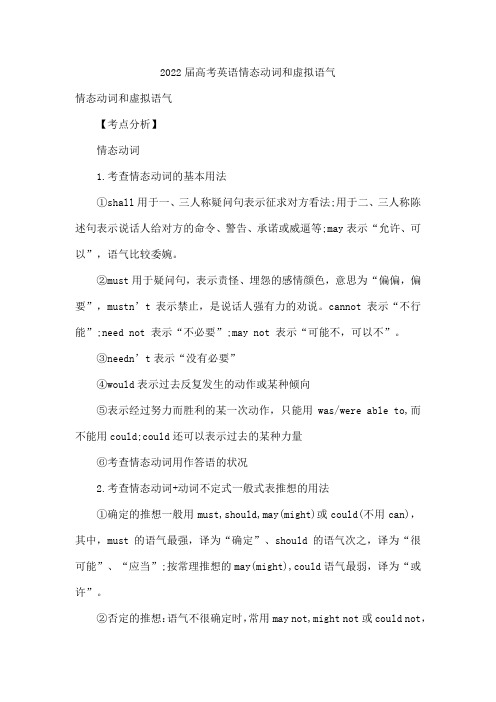
2022届高考英语情态动词和虚拟语气情态动词和虚拟语气【考点分析】情态动词1.考查情态动词的基本用法①shall用于一、三人称疑问句表示征求对方看法;用于二、三人称陈述句表示说话人给对方的命令、警告、承诺或威逼等;may表示“允许、可以”,语气比较委婉。
②must用于疑问句,表示责怪、埋怨的感情颜色,意思为“偏偏,偏要”,mustn’t表示禁止,是说话人强有力的劝说。
cannot 表示“不行能”;need not 表示“不必要”;may not 表示“可能不,可以不”。
③needn’t表示“没有必要”④would表示过去反复发生的动作或某种倾向⑤表示经过努力而胜利的某一次动作,只能用was/were able to,而不能用could;could还可以表示过去的某种力量⑥考查情态动词用作答语的状况2.考查情态动词+动词不定式一般式表推想的用法①确定的推想一般用must,should,may(might)或could(不用can),其中,must的语气最强,译为“确定”、should的语气次之,译为“很可能”、“应当”;按常理推想的may(might),could语气最弱,译为“或许”。
②否定的推想:语气不很确定时,常用may not,might not或could not,译为“可能不”“或许不”;否定语气较强时,则用can’t,译为“根本不行能”、“想必不会”,表示惊异、怀疑的感情颜色③疑问句中推想往往用can或could3.考查情态动词+动词不定式的完成式表推想的用法4.考查情态动词+动词不定式完成式的其他用法①should(ought to)+不定式的完成式:原来应当做而实际上又没有做。
其否定形式表示某中行为不该发生却发生了。
②needn’t+不定式的完成式:原来不必要做的而实际上又做了③could+不定式的完成式:本可以做而实际上未能做,含有圆满的意味虚拟语气1.虚拟条件句的基本结构及其用法①与现在事实相反的虚拟条件句②与过去事实相反的虚拟条件句③与将来事实相反的虚拟条件句2.虚拟语气的活用①时间错综虚拟结构②省略if的虚拟结构③并列连词或副词示意的虚拟结构④介词或介词短语示意的虚拟结构⑤as if / as though方式状语从句中的虚拟语气⑥名词性从句中的虚拟语气⑦分词短语示意的虚拟结构⑧上下文语境中的虚拟结构【学问点归纳】i.情态动词1.表示“力量、许可”的can /may①表示力量的情态动词用can/coulda computer_____think for itself, it must be told what to do.a.can’tb.couldn’tc.may notd.might not②表示许可时用may/might ,can/could 都可以,但在问句中用could…?或might…? 以使口气委婉客气,其回答肯定要用can或may,以使回答口气明确(must表示肯定,必需,mustn’t表示禁止,不许可) —could i call you by your first name? —yes, you______a.willb.couldc.mayd.mightjohnny, you_____play with the knife, you_____hurt yourself.a. won’t/can’tb.mustn’t/mayc.shouldn’t/mustd.can’t/shouldn’t③在确定句中could不行以用来表示过去某一特定场合的力量,而要用was/were able to。
- 1、下载文档前请自行甄别文档内容的完整性,平台不提供额外的编辑、内容补充、找答案等附加服务。
- 2、"仅部分预览"的文档,不可在线预览部分如存在完整性等问题,可反馈申请退款(可完整预览的文档不适用该条件!)。
- 3、如文档侵犯您的权益,请联系客服反馈,我们会尽快为您处理(人工客服工作时间:9:00-18:30)。
高考英语考前冲刺专题强化情态动词和虚拟语气一、几组常见情态动词的含义及用法1.can和could的用法can可以表示能力;表示客观的可能性;表示请示和允许;表示惊异、怀疑、不相信的态度,主要用于肯定句、否定句和疑问句。
表示对现在或将来的推测时,两者均可用,但can通常只用于否定句或疑问句中,一般不用于肯定句,而could则可用于肯定句、否定句和疑问句。
could可表示请求,语气较之can更委婉,多用于疑问句,其答语应用can。
[典例1] (2011年高考江西卷)It________be the postman at the door.It's only six o'clock.A.mustn't B.can'tC.won't D.needn't[解析] 句意:门口的人不可能是邮递员,现在才六点。
mustn't禁止,不许;can't不可能;won't将不会;needn't不需要。
根据“现在才六点”可知说话者作出“不可能”的推断。
[答案] B点金can的用法集锦1.cannot....to...“越……越好,无论怎样……也不过分”与can never...too同义。
2.cannot/could not but+动词原形表示“只有,除……之外别无可能”,cannot help but +动词原形及cannot help+动名词表示“不可避免某事”。
3.can/could+否定词+动词原形+形容词或副词的比较级,这一结构形式上是否定的,意义上却强调一种肯定。
如:I couldn't agree more。
2.may与might的用法在表示允许的时候,若表示请求别人允许自己做某事,两者都可用,只是might表示的语气较委婉;表示自己允许别人做某事,通常要用may而不用might。
在通常情况下,may表示允许(请求允许或给予允许)时,总是针对“现在”或“将来”而言,若要表示已经给予或已经存在的允许,则通常不用may,而用can。
在表示推测的时候,两者都可用,只是might比may语气更不确定,表示的可能性更小。
此外may/might(just)as well“不妨,最好”,其意义与had better相近。
3.must和have to的用法must表示“必须,应该”之意,语气比should,ought to强烈;must be+doing/adj.表示对现在情况有把握的推测,意为“一定,准是,想必”,用于肯定句中。
其否定形式mustn't 表示“不准,不应该,禁止”等意。
have to“必须,不得不”,意义与must相近。
但must表示的是说话人的主观看法,而have to 则往往强调客观需要;must只有一种形式,即现在式与过去式都是一种形式,而have to则涉及人称、时态等方面的变化。
另外情态动词must表示决心,意思是“一定要”、“坚持”;或表示命中注定或(某事发生的)必然性,意思是“必定会”。
[典例2] —Good morning.I've got an appointment with Miss Smith in the Personnel Department.—Ah,good morning.You ________be Mrs.Peters.A.might B.mustC.would D.can[解析] 此处考查must表示肯定推测的用法。
根据“I've got an appointment wi th Miss Smith in the Personnel Department.”可知,答话者能够肯定地推测出此人就是Mrs.Peters,所以此处要用must。
[答案] B[典例3] You ________buy a gift,but you can if you want to.A.must B.mustn'tC.have to D.don't have to[解析] 从后面的you can if you want to可知“买礼物”这件事可做也可以不做,因此我们可推知前一分句表达的意思是“你没有必要(don't have to)买礼物”。
而mustn't表示禁止做某事,不符合题意。
[答案] D4.shall与should,ought to的用法shall用于第一、第三人称且用于疑问句时,表示说话人征求对方的意见或向对方请示;shall 用于第二、第三人称且用于陈述句时,表示命令、警告或威胁。
should可表示劝告或建议,意为“应该”;表示推测,意为“可能”;表示出乎意料,意为“竟然”;should do表示某种情况是合理的,符合逻辑的,用于第一人称且用于疑问句时表示征询意见。
ought to表示“有义务”或“必要”,含劝告或推测之意。
[典例4] —I haven't got the reference book yet,but I'll have a test on the subject next month.—Don't worry.You ________have it by Friday.A.could B.shallC.must D.may[解析] 根据上文的“Don't worry.”,可知答话者对上文的说话者进行安慰,并且“许诺到周五前能拥有参考书”,此处shall用于第二人称表示许诺。
[答案] B二、虚拟语气在条件句中的使用点金在虚拟条件句中,若有动词were,should或had,有时可以省略连词if,而把这三个词放在主语之前,变成倒装句。
[典例5] Had I known about this computer program,a huge amount of time and energy ________.A.would have been saved B.had been savedC.will be saved D.was saved[解析] 根据句子的倒装特征判断此处是省略了if的虚拟条件句,此句可还原为“If I had known about this computer program,a huge amount of time and energy ________.”。
此处表示与过去事实相反的假设,故A项正确。
句意:如果我早知道这个电脑程序,就可以节省大量的时间和精力了。
[答案] A[典例6] (2011年高考陕西卷)I________ through that bitter period without your generous help.A.couldn't have gone B.didn't goC.wouldn't go D.hadn't gone[解析] 句意:没有你的慷慨帮忙,我不可能熬过那段痛苦的日子。
从without your generous help可知,此处考查的是与过去事实相反的虚拟语气。
故选A。
[答案] A三、虚拟语气在其他从句中的使用1.虚拟语气有时候在假设的情况不是以条件句的形式呈现的,而是用介词without,but for 等或用连词but,or,otherwise等来表示的。
2.表示建议、要求、命令、决定、督促的动词,如suggest,propose,recommend,insist,order,demand,request,advise,command,require,urge等后面的that从句中要用虚拟语气,谓语动词用“should+动词原形”,should可省略。
但是,当suggest作“暗示,表明”讲时,不用虚拟语气,从句的谓语动词的形式要视情况而定。
insist当“坚持说”讲时,不用虚拟语气,从句的谓语动词的形式要视情况而定。
3.suggestion,order,proposal,demand,request,advice,idea等名词在句中作主语、表语、宾语,并且后面出现表语从句、同位语从句时,从句的谓语要用should+动词原形,should可省略。
4.wish/if only(要是……就好了)表示不可能实现的愿望,其后用动词的过去式表示与现在事实相反的虚拟语气;用had done表示与过去事实相反的虚拟语气;用could/would/might do 表示将来没有把握或不太可能实现的愿望。
5.as if/as though作“好像”讲,引导方式状语从句,表示一种非真实的情况时,用虚拟语气。
从句中的谓语动词形式与wish/if only后的从句中的谓语动词形式相同。
6.It's(high)time that+主语+did/should+动词原形,表示说话人的建议或愿望。
7.It's necessary/important/strange...that...句式表达了说话者的命令、要求、建议等,从句中谓语应用should+动词原形,其中should可省略。
8.would rather后跟从句,表示主语“宁愿让某人干某事”时,从句要用虚拟语气,即用一般过去时表示现在或将来要做的事;用过去完成时表示过去要做的事。
[典例7] (2011年高考北京卷)—Where are the children? The dinner's going to be completely ruined.—I wish they________always late.A.weren't B.hadn't beenC.wouldn't be D.wouldn't have been[解析] 句意:“孩子们在哪儿?这顿饭要彻底毁了。
”“我但愿他们不会总来晚。
”从“Where are the children?”可知,说话人指现在。
根据动词 wish 后的宾语从句用虚拟语气的用法可知,表示与现在事实相反的情况时,从句用一般过去时态,因此选项A正确。
[答案] A高考秘笈1.学习和掌握情态动词的意义和用法,应遵循如下步骤:(1)阅读语法参考书,首先从整体上把握情态动词的语法特征和语义特征;(2)逐个学习,了解每个情态动词的用法特征;(3)认真区别具有相同功能的、意义相近的情态动词的用法;(4)收集大量真实的口语材料(如教材中的对话材料及听力材料),在真实的交际情景中印证和领悟它们的用法和特征。
2.正确分析句子语境历年高考对情态动词的考查都是考查其在具体语境中的运用,只要正确分析语境即可正确选择答案。
3.注意谓语动作发生的时间(1)如果推测过去的情况,情态动词后用完成式;(2)如果推测正在进行的情况,情态动词后用进行式;(3)如果推测现在的情况,情态动词后用动词原形;(4)如果推测将来的情况,用may/might+动词原形。
